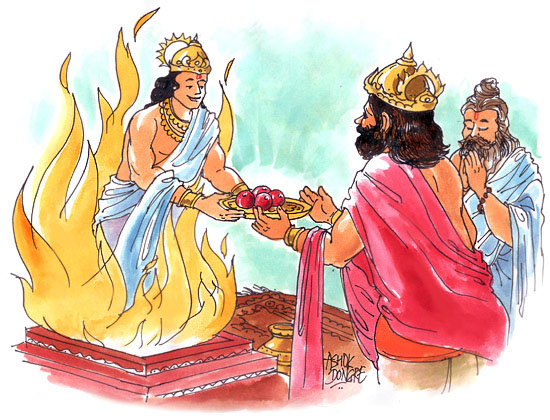Apr 18, 2025
Apr 18, 2025
King Dasharatha had three wives, namely Kausalya, Sumitra, and Kaikeyi. The queens were beautiful, royal, graceful, and faithful to the king. Simplicity, selflessness, modesty, and willingness to sacrifice their everything for the king and the kingdom all such virtues, typical of Indian Womanhood, were embodied in them. They never complained about inconvenience, suffering, pain, and deficiencies any time, although such situations were rare in a royal house.

However, despite a long married life, none of the queens was blessed with motherhood. Silently, as is every Indian woman's wont, they longed for their own son or daughter. The king was also aware of the undercurrent of gloom all around the palace and the kingdom. As was customary in those ancient times, the king was advised to perform sacrificial rituals (called Yagna). Accordingly, arrangements were made for the vast resources required for such Yagna. Due invitations were sent to the most learned and expert 'Pandits' and Brahmins who would perform such a Yagna. Many months passed by in these rituals, and at last the Yagna-Devata (The God) was pleased and the rituals and sacrifices bore fruits. Out of the Yagna-Kunda arose one Divine Form who said:
"O king, I am very much pleased with your deep faith and devotion in me. I offer you these four fruits which would fulfill the desires of the royal family. Your queens would bear sons in due course of time after ingesting the fruit."
The king, the queens, and for that matter whole of the kingdom of Ayodhya was agog with pleasure and joy that knew no bounds. Kausalya and Kaikeyi received one fruit each, and remaining two came to the lot of Sumitra.
In due course of time Rama was born to Kausalya, Bharata to Kaikeyi, and Sumitra gave birth to two sons--Laxmana and Shatrughna.
The palace was filled with joy and merriment. The queens were overjoyed with the arrival of these four lovely princes. Rama was born of the eldest queen and hence attracted special attention, as the eldest son always had the first claim to the royal throne.
The four brothers grew under the loving care of their parents and relatives in the royal comforts of the palace. There was no want nor deficiency of any kind. All the four princes were sharp, intelligent, brave, and healthy. They were obedient and respectful towards their parents and teachers; and the love amongst these four brothers knew no precedence.
As they grew up, the old king made arrangements for their best education in humanities, art, science, and expertise in war-games. They acquired all special skills in archery, etc. at the holy feet of their teachers: Vashishtha and Vishwamitra.
Years passed by and the children grew in lovable, bold, and brave adolescence. Their command over bow and arrow was not to be equaled by anyone on the earth. (Sri Rama was the incarnation of Lord Vishnu, the savior of the universe, who had come to the earth to eliminate the evil and restore Dharma - righteousness. But this divine play cannot be known to many. Only a few sages were aware that Divinity had taken birth on this earth. Rest (like us) including the king, the queens, the citizens of Ayodhya took Rama and his brothers as ordinary humans.)
Rama and Laxmana Defeat the Demons
Meanwhile the forest dwelling rishis and sages encountered great obstacles and difficulties in performing their rituals of Yagnas. The evil tendencies in the form of demons used to interfere in their practice and rites by way of beating up the rishis and their associates. Moreover, the demons used to pour blood and flesh in the sacrificial fire which made the Yagna 'impure'.
Therefore, a delegation of such rishis and sages led by the great sage Vishwamitra requested king Dasharatha to send Rama and Laxmana to their rescue. They convinced the king that although Rama and Laxmana were young and inexperienced, their bravery was unparalleled and unchallenged. These two brothers alone were capable of fighting the mighty demons and teach them a lesson for ever.
The tender heart of the Mother tried to resist this tough request. No mother wants her beloved son to take to such an arduous task at such a tender age. But the noble and dutiful king acceded to the just request of the rishis.
21-Aug-2010
More by : Dr. C.S. Shah